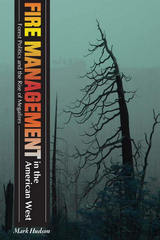
Drawing on correspondence both between and within the Forest Service and the major timber industry associations, newspaper articles, articles from industry outlets, and policy documents from the late 1800s through the present, Hudson shows how the US forest industry, under the constraint of profitability, pushed the USFS away from private industry regulation and toward fire exclusion, eventually changing national forest policy into little more than fire policy.
More recently, the USFS has attempted to move beyond the policy of complete fire suppression. Interviews with public land managers in the Pacific Northwest shed light on the sources of the agency's struggles as it attempts to change the way we understand and relate to fire in the West.
Fire Management in the American West will be of great interest to environmentalists, sociologists, fire managers, scientists, and academics and students in environmental history and forestry.
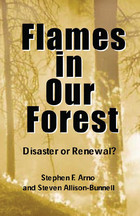
Shaped by fire for thousands of years, the forests of the western United States are as adapted to periodic fires as they are to the region's soils and climate. Our widespread practice of ignoring the vital role of fire is costly in both ecological and economic terms, with consequences including the decline of important fire-dependent tree and undergrowth species, increasing density and stagnation of forests, epidemics of insects and diseases, and the high potential for severe wildfires.
Flames in Our Forest explains those problems and presents viable solutions to them. It explores the underlying historical and ecological reasons for the problems associated with our attempts to exclude fire and examines how some of the benefits of natural fire can be restored Chapters consider:
- the history of American perceptions and uses of fire in the forest
- how forest fires burn
- effects of fire on the soil, water, and air
- methods for uncovering the history and effects of past fires
- prescribed fire and fuel treatments for different zones in the landscape
Flames in Our Forest presents a new picture of the role of fire in maintaining forests, describes the options available for restoring the historical effects of fires, and considers the implications of not doing so. It will help readers appreciate the importance of fire in forests and gives a nontechnical overview of the scientific knowledge and tools available for sustaining western forests by mimicking and restoring the effects of natural fire regimes.
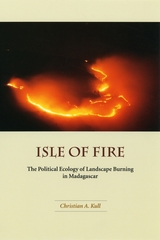
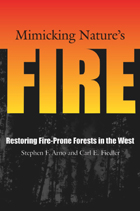
The magnificent stands of old-growth trees that characterize the forests of western North America depend on periodic fires for their creation or survival. Deprived of that essential disturbance process eventually they die, leaving an overcrowded growth of smaller trees vulnerable to intense blazes and epidemics of insects and disease.
In Mimicking Nature's Fire, forest ecologists Stephen Arno and Carl Fiedler present practical solutions to the pervasive problem of deteriorating forest conditions in western North America. Advocating a new direction in forest management, they explore the promise of "restoration forestry" -- an ecologically based approach that seeks to establish forest structures in which fire can once again serve as a beneficial process rather than as a destructive aberration.
The book begins with an overview of fundamentals: why traditional forestry tried to exclude fire from forests, why that attempt failed, and why foresters and ecologists now recognize the need for management based on how natural ecosystems operate. Subsequent chapters consider: how fire's historic role provides a foundation for designing restoration strategies; why a hands-off approach will not return forests to their historical condition; how management goals influence the strategies used in restoration forestry.
The second part of the book presents case studies of restoration projects in the western United States and Canada, representing different forest types, different historic fire regimes, and contrasting management goals. For each project, the authors describe why and how the project is being conducted, profile forest conditions, and describe methods of treatment. They also report what has been accomplished, identify obstacles to restoration, and offer their candid but understanding evaluation. Mimicking Nature's Fire concludes by placing restoration forestry in the broad context of conserving forests worldwide and outlining factors critical for its success.
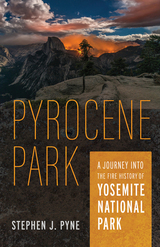
In the last decade, fire has blasted into public attention. California’s blazes have captured national and global media interest with their drama and urgency. Expand the realm of fire to include the burning of fossil fuels, and the fire story also subsumes climate change. Renowned fire historian Stephen J. Pyne argues that the relationship between fire and humans has become a defining feature of our epoch, and he reveals how Yosemite offers a cameo of how we have replaced an ice age with a fire age: the Pyrocene.
Organized around a backcountry trek to a 50-year experiment in restoring fire, Pyrocene Park describes the 150-year history of fire suppression and management that has led us, in part, to where the park is today. But there is more. Yosemite’s fire story is America’s, and the Earth’s, as it shifts from an ice-informed world to a fire-informed one. Pyrocene Park distills that epic story into a sharp miniature.
Flush with people, ideas, fires, and controversy, Pyrocene Park is a compelling and accessible window into the American fire scene and the future it promises.
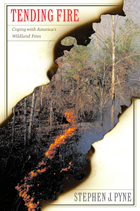
The wildfires that spread across Southern California in the fall of 2003 were devastating in their scale-twenty-two deaths, thousands of homes destroyed and many more threatened, hundreds of thousands of acres burned. What had gone wrong? And why, after years of discussion of fire policy, are some of America's most spectacular conflagrations arising now, and often not in a remote wilderness but close to large settlements?
That is the opening to a brilliant discussion of the politics of fire by one of the country's most knowledgeable writers on the subject, Stephen J. Pyne. Once a fire fighter himself (for fifteen seasons, on the North Rim of the Grand Canyon) and now a professor at Arizona State University, Pyne gives us for the first time a book-length discussion of fire policy, of how we have come to this pass, and where we might go from here.
Tending Fire provides a remarkably broad, sometimes startling context for understanding fire. Pyne traces the "ancient alliance" between fire and humanity, delves into the role of European expansion and the creation of fire-prone public lands, and then explores the effects wrought by changing policies of "letting burn" and suppression. How, the author asks, can we better protect ourselves against the fires we don't want, and better promote those we do?
Pyne calls for important reforms in wildfire management and makes a convincing plea for a more imaginative conception of fire, though always grounded in a vivid sense of fire's reality. "Amid the shouting and roar, a central fact remains," he writes. "Fire isn't listening. It doesn't feel our pain. It doesn't care-really, really doesn't care. It understands a language of wind, drought, woods, grass, brush, and terrain, and it will ignore anything stated otherwise."
We need to think about fire in more deeply biological ways and recognize ourselves as the fire creatures we are, Pyne argues. Even if, in recent times, "we have gone from being keepers of the flame to custodians of the combustion chamber," tending fire wisely remains our responsibility as a species. "The Earth's fire scene," he writes of us, "is largely the outcome of what this creature has done, and not done, and the species operates not according to strict evolutionary selection but in the realm of culture, which is to say, of choice and confusion."
Rich in insight, wide-ranging in its subject, and clear-eyed in its proposals, Tending Fire is for anyone fascinated by fire, fire policy, or human culture.
READERS
Browse our collection.
PUBLISHERS
See BiblioVault's publisher services.
STUDENT SERVICES
Files for college accessibility offices.
UChicago Accessibility Resources
home | accessibility | search | about | contact us
BiblioVault ® 2001 - 2024
The University of Chicago Press









